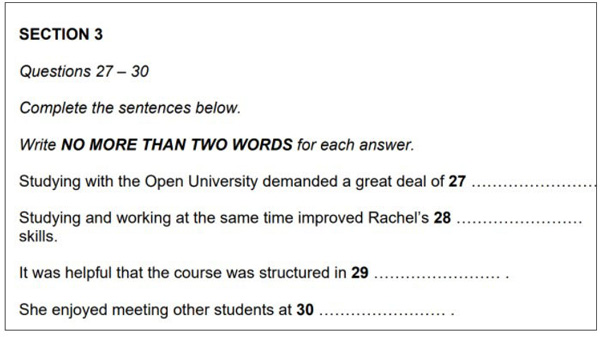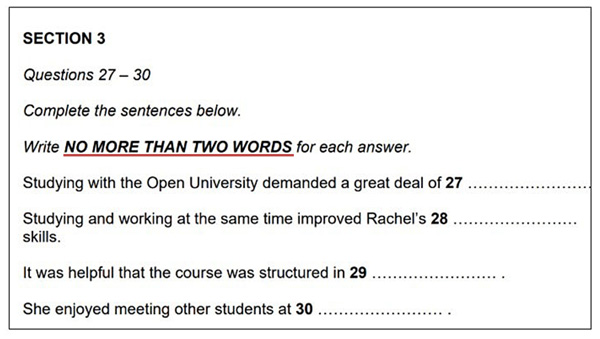Master IELTS Listening Sentence/Summary Completion with IELTS-Testpro
IELTS Listening Sentence/Summary Completion questions can be deceptive. While they may look like simple gap-fills, they test your ability to predict grammatical structures and identify clever paraphrasing. In this guide, IELTS-Testpro provides you with a structured approach to crack these two question types and turn them into your scoring strengths.
I. Introduction to Sentence/Summary Completion Questions in IELTS Listening
In IELTS Listening Sentence and Summary Completion tasks, you are presented with a set of sentences or a short paragraph summarizing information from the audio clip. Your goal is to fill in the missing words based on what you hear.


The challenge lies in the language used. The vocabulary in the question sheet will rarely match the recording exactly. Instead, the test designers use synonyms and paraphrases to rigorously test your:
- Listening comprehension: Understanding the core message amidst distractors.
- Vocabulary range: Identifying that “global popularity” in the text matches “loved all around the world” in the audio.
At IELTS-Testpro, we believe that despite the difficulty, these are highly predictable question types. With the right strategy, you can secure maximum points here.
>>> Practice now: IELTS Listening Practice Test
II. Integrated Strategies for IELTS Listening Sentence/Summary Completion
To navigate these questions efficiently, IELTS-Testpro experts recommend this 5-step strategy, with specific tips and common pitfalls integrated directly into each step to help you avoid losing marks unnecessarily.

1. Read the questions and requirements carefully
The instructions in all question types in IELTS Listening, especially Sentence Completion and Summary Completion Questions play a pivotal role in deciding whether your answers are accepted or not. The word limit instructions are non-negotiable.
- The Strategy: Always circle the word limit (e.g., “NO MORE THAN TWO WORDS AND/OR A NUMBER”) before you read the text.
- Common Pitfall: Many candidates correctly hear the answer “a red car” but write it down despite a “TWO WORDS” limit, resulting in a score of zero. In this case, “red car” would be the correct entry. Note that hyphenated words (e.g., part-time) count as single words.

2. Read the incomplete sentences/summary and Identify keywords
When preparing for IELTS Listening Summary or Sentence Completion, you must fully understand the meaning of the incomplete text. Take a few seconds to underline keywords and phrases in the sentences or summary. This helps you focus better while listening.

3. Predict the answers
Before the audio starts, try predicting the missing words in the IELTS Listening Sentence or Summary questions. Identify the type of word needed (noun, verb, adjective, number, etc.) and use context clues. Remember that predictions are only a guide—you must confirm answers by listening carefully to the recording.
For example, in the picture below, the first gap should be a verb because it stands behind the phrase “in order to” indicating a purpose. Besides, you can immediately guess “protect” for the blank on the basis of the sentence’s meaning (the army’s responsibility is to protect the emperor).

Moreover, the audio will not use the same words or phrases as in the incomplete sentences or summary, hence, think of the possible synonyms and paraphrases that may appear.
For instance, the statement “football is the most favorite game all around the world” can become “wherever you go on earth, you will find no other sports that can beat the popularity of football” in the audio.
4. Listen and fill in the blanks
When the audio begins, concentrate on the context of the IELTS Listening Sentence or Summary task. Pay attention to synonyms, paraphrases, and contrast words. These often signal the correct answer.
5. Double-check answers
At the end of the test, you will have 10 minutes to transfer answers. Use this time to ensure your IELTS Listening Sentence and IELTS Listening Summary answers are spelled correctly and make grammatical sense.
III. Common Problems & Tips for IELTS Sentence/Summary Completion Questions

| Common Problems and Mistakes | Tips |
| 1. Ignore the instructions
Many candidates forget to take the instructions into consideration then lose a point because of going beyond the word limit. |
Read the instructions in the first place. Be careful with NO MORE THAN THREE WORDS AND/OR A NUMBER.
(Remember that numbers are written numerically, such as 40; and hyphenated words, such as garden-filled, count as one word.) |
| 2. Leaving blank answers
A predictive answer may gain you a point so don’t leave any answers blank |
Write down your predictive answers on the answer sheet even when you are unsure about those |
| 3. Looking for the exact same words or phrases in the recording after reading the incomplete sentences or the summary
Changeable keywords are likely to be changed into different forms such as synonyms or paraphrases, hence, don’t try to find identical words or phrases when listening or you will miss the information |
Think of and/or note down possible synonyms or paraphrases of keywords in the summary in the preparation step |
| 4. Apply background knowledge or logic to answer the questions
The IELTS Listening test focus on neither your background knowledge nor personal experience but your listening skill |
Use the words and phrases mentioned in the audio only |
| 5. Being trapped by the examiner
Some linking words of contrast such as however, but, except, apart from, etc. can hinder your chance to get a point if you don’t listen carefully to the information
(e.g. “The venue is most famous for its operatic performances but pop concerts are equally as popular today.”) |
Listen carefully to the information mentioned and pay more attention to the contrast words since the answers are often located after these words |
> > > Read more: IELTS listening map
Other tips for IELTS Listening Sentence/Summary Completion Questions:
- Sequential Order: Fortunately, answers in Sentence and Summary Completion tasks almost always appear in the same order as the audio. If you miss one, move on instantly so you don’t miss the next.
- Grammar Check: If the sentence says “a [___],” the answer must be a singular noun or an adjective-noun phrase beginning with a consonant sound. Use these clues!
- Focus on Surroundings: Pay close attention to the words immediately before and after the gap. They are your best clues for when the answer is coming.
Mastering both IELTS Listening Sentence and IELTS Listening Summary Completion Questions can significantly boost your listening band score. With practice, strategies, and attention to detail, you’ll turn these tricky tasks into scoring opportunities.
Don’t waste a minute but use IELTS TEST PRO and practice with us now!